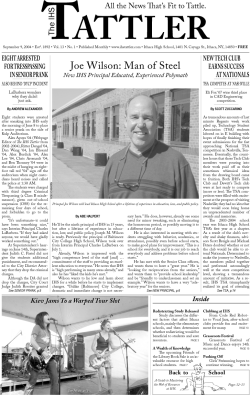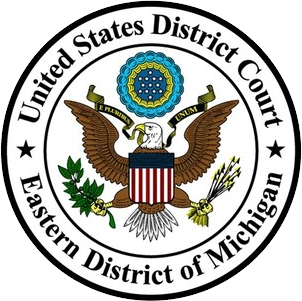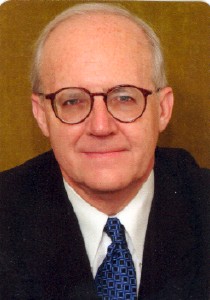
The Tattler is the student newspaper of Ithaca High School in Ithaca, New York. Founded in 1892, it is one of the oldest student newspapers in the United States. It is published twelve times a year and has a circulation of about 3,000, with distribution in both the school and in the community.
Tinker v. Des Moines Independent Community School District, 393 U.S. 503 (1969), was a landmark decision by the United States Supreme Court that defined First Amendment rights of students in U.S. public schools. The Tinker test, also known as the "substantial disruption" test, is still used by courts today to determine whether a school's interest to prevent disruption infringes upon students' First Amendment rights.
The term in loco parentis, Latin for "in the place of a parent", refers to the legal responsibility of a person or organization to take on some of the functions and responsibilities of a parent.

A student publication is a media outlet such as a newspaper, magazine, television show, or radio station produced by students at an educational institution. These publications typically cover local and school-related news, but they may also report on national or international news as well. Most student publications are either part of a curricular class or run as an extracurricular activity.

Dean v. Utica Community Schools, 345 F. Supp. 2d 799, is a landmark legal case in United States constitutional law, namely on how the First Amendment applies to censorship in a public school environment. The case expanded on the ruling definitions of the Supreme Court case Hazelwood School District v. Kuhlmeier, in which a high school journalism-oriented trial on censorship limited the First Amendment right to freedom of expression in curricular student newspapers. The case consisted of Utica High School Principal Richard Machesky ordering the deletion of an article in the Arrow, the high school's newspaper, a decision later deemed "unreasonable" and "unconstitutional" by District Judge Arthur Tarnow.

Danny Julian Boggs is an American attorney and a senior United States circuit judge of the United States Court of Appeals for the Sixth Circuit. He was appointed to the court in 1986 and served as its Chief judge from September 2003 to August 2009. Boggs was on the short list of President George W. Bush's candidates for the U.S. Supreme Court.

Hazelwood School District (HSD) is a school district in suburban St. Louis, Missouri and is the second largest district in St. Louis County. The District extends from I-70 on the west and the I-270 bridge on the east, covering 78 square miles, an area larger than the City of St. Louis. Its northern and southern boundaries are the two Great Rivers, the Missouri and the Mississippi, and I-270.

The United States District Court for the Eastern District of Missouri is a trial level federal district court based in St. Louis, Missouri, with jurisdiction over fifty counties in the eastern half of Missouri. The court is one of ninety-four district-level courts which make up the first tier of the U.S. federal judicial system. Judges of this court preside over civil and criminal trials on federal matters that originate within the borders of its jurisdiction. It is organized into three divisions, with court held in St. Louis, Hannibal, and Cape Girardeau.
Morse v. Frederick, 551 U.S. 393 (2007), is a United States Supreme Court case where the Court held, 5–4, that the First Amendment does not prevent educators from suppressing student speech that is reasonably viewed as promoting illegal drug use at or across the street from a school-supervised event. In 2002, Juneau-Douglas High School principal Deborah Morse suspended student Joseph Frederick after he displayed a banner reading "BONG HiTS 4 JESUS" [sic] across the street from the school during the 2002 Winter Olympics torch relay. Frederick sued, claiming his constitutional rights to free speech were violated. His suit was dismissed by the federal district court, but on appeal, the Ninth Circuit reversed the ruling, concluding that Frederick's speech rights were violated. The case then went on to the Supreme Court.

Desilets v. Clearview Regional Board of Education, 137 N.J. 585 (1994), was a New Jersey Supreme Court decision that held that public school curricular student newspapers that have not been established as forums for student expression are subject to a lower level of First Amendment protection than independent student expression or newspapers established as forums for student expression.

In Guiles v. Marineau, 461 F.3d 320, cert. denied by 127 S.Ct. 3054 (2007), the U.S. Court of Appeals for the Second Circuit held that the First and Fourteenth Amendments to the Constitution of the United States protect the right of a student in the public schools to wear a shirt insulting the President of the United States and depicting images relating to drugs and alcohol.

California Education Code 48907 (1977), also known as the California Student Free Expression Law, acts as a counter to the Hazelwood v. Kuhlmeier (1988) Supreme Court ruling, which limited the freedom of speech granted to public high school newspapers. The Hazelwood v. Kuhlmeier decision held that public school curricular student newspapers that have not been established as "forums for student expression" are subject to a lower level of First Amendment protection than independent student expression or newspapers established as forums for student expression. Ed Code 48907 affirms the right of high school newspapers to publish whatever they choose, so long as the content isn't explicitly obscene, libelous, or slanderous, and doesn’t incite students to violate any laws or school regulations. The newspaper content must also pass the minimal disruption test set forth in the Supreme Court ruling on Tinker v. Des Moines (1969). In contrast with Hazelwood, which limited First Amendment protection to only those high school newspapers that had, through practice or policy, been established as forums for student expression, Ed Code 48907 affirms the right of all newspapers to the freedom of expression.
Lamb's Chapel v. Center Moriches Union Free School District, 508 U.S. 384 (1993), was a decision by the Supreme Court of the United States concerning whether the Free Speech Clause of the First Amendment was offended by a school district that refused to allow a church access to school premises to show films dealing with family and child-rearing issues faced by parents. In a unanimous decision, the court concluded that it was.
The issue of school speech or curricular speech as it relates to the First Amendment to the United States Constitution has been the center of controversy and litigation since the mid-20th century. The First Amendment's guarantee of freedom of speech applies to students in the public schools. In the landmark decision Tinker v. Des Moines Independent Community School District, the U.S. Supreme Court formally recognized that students do not "shed their constitutional rights to freedom of speech or expression at the schoolhouse gate".

Hosty v. Carter was a 2005 decision by the United States Court of Appeals for the Seventh Circuit that limited the free press rights of college newspapers.
Hazelwood School District v. United States, 433 U.S. 299 (1977), was a court case argued before the United States Supreme Court on April 27, 1977. It concerned employment discrimination and was decided on June 27, 1977.
The censorship of student media in the United States is the suppression of student-run news operations' free speech by school administrative bodies, typically state schools. This consists of schools using their authority to control the funding and distribution of publications, taking down articles, and preventing distribution. Some forms of student media censorship extend to expression not funded by or under the official auspices of the school system or college.
Hazelwood School District et al. v. Kuhlmeier et al., 484 U.S. 260 (1988), was a landmark decision by the Supreme Court of the United States that held that public school curricular student newspapers that have not been established as forums for student expression are subject to a lower level of First Amendment protection than independent student expression or newspapers established as forums for student expression.

Frank D. LoMonte is an American lawyer and journalist known for his press freedom advocacy. He is the director of the Brechner Center for Freedom of Information, part of the University of Florida's College of Journalism and Communications, and was previously the executive director of the Student Press Law Center from 2008 to 2017.

In June 2022, the Viking Saga, the student newspaper of Northwest High School in Grand Island, Nebraska, in the United States, published an issue that discussed Pride Month and other LGBTQ-related topics. In response, the school board and superintendent eliminated the school's journalism program and closed down the paper. The newspaper had been advised that transgender staff should not use their preferred names on bylines, and must use the names they had been given at birth.












